- Clone
- 1B4C3 (See other available formats)
- Regulatory Status
- RUO
- Other Names
- erbB-3, erbB3, HER-3, HER3
- Isotype
- Mouse IgG2a, κ
- Ave. Rating
- Submit a Review
- Product Citations
- publications
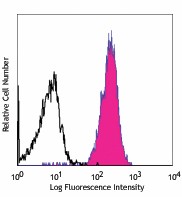
-

Human breast cancer cell line MCF-7 stained with 1B4C3 APC
| Cat # | Size | Price | Save |
|---|---|---|---|
| 324707 | 25 tests | ¥31,240 | |
| 324708 | 100 tests | ¥77,000 |
The 1B4C3 monclonal antibody recognizes human erbB3/HER3 also know as oncogene erbB3, tyrosine kinase cell surface receptor HER3, and C-erbB3. erbB3/HER3 is a receptor tyrosine kinase and a member of the epidermal growth factor receptor family. erbB3/HER3 binds the heregulin ligands and contains 4 furin-like repeats, 2 cheY receiver domains, and a tyrosine kinase domain with a predicted molecular weight approximately 148 kD. Signaling through the erbB3/HER3 receptor induces proliferation and differentiation in some cell types, the receptor is widely expressed in many tissues including kidney, lung, brain, placenta, skin and stomach. erbB3/HER3 forms constitutively active heterodimers with erbB2/HER2 in a subset of human mammary tumors; expression of erbB3/HER3 reported be linked to favorable outcome in bladder and ovarian cancer. erbB3/HER3 has been shown to interact with a number of proteins including EGF receptor, erbB2/HER2, erbB4, Grb2, Grb7, SOS1, cdk5, SHC, FAK, PTK6, and others. The erb3/HER3 receptor is extensively phosphorylated at residues T873 and S1123 (by cdk5); Y1199, Y1262, Y1289, and Y1328. The 1B4C3 antibody has been shown to be useful for flow cytometric detection of human erbB3/HER3.
Product DetailsProduct Details
- Verified Reactivity
- Human
- Antibody Type
- Monoclonal
- Host Species
- Mouse
- Immunogen
- NIH-3T3 cells transfected with human erbB3/HER3
- Formulation
- Phosphate-buffered solution, pH 7.2, containing 0.09% sodium azide and BSA (origin USA)
- Preparation
- The antibody was purified by affinity chromatography, and conjugated with APC under optimal conditions.
- Concentration
- Lot-specific (to obtain lot-specific concentration and expiration, please enter the lot number in our Certificate of Analysis online tool.)
- Storage & Handling
- The antibody solution should be stored undiluted between 2°C and 8°C, and protected from prolonged exposure to light. Do not freeze.
- Application
-
FC - Quality tested
- Recommended Usage
-
Each lot of this antibody is quality control tested by immunofluorescent staining with flow cytometric analysis. For flow cytometric staining, the suggested use of this reagent is 5 µl per million cells in 100 µl staining volume or 5 µl per 100 µl of whole blood.
- Excitation Laser
-
Red Laser (633 nm)
- Product Citations
-
- RRID
-
AB_2099568 (BioLegend Cat. No. 324707)
AB_2099567 (BioLegend Cat. No. 324708)
Antigen Details
- Structure
- Member of the epidermal growth factor receptor family. A receptor tyrosine kinase containing 4 furin-like repeats, 2 cheY receiver domains, and a tyrosine kinase domain. Predicted molecular weight approximately 148 kD
- Distribution
-
Widely expressed in many tissues including kidney, lung, brain, placenta, skin and stomach. Forms constitutively active heterodimers with erbB2/HER2 in a subset of human mammary tumors; expression of erbB3/HER3 reported be linked to favorable outcome in b
- Function
- Induces extensive signaling cascade that can regulate growth and possibly differentiation
- Ligand/Receptor
- Heregulin
- Modification
- Extensively phosphorylated T873 and S1123 (by cdk5); Y1199, Y1262, Y1289, Y1328
- Biology Area
- Cancer Biomarkers, Cell Biology, Immunology, Neuroscience, Synaptic Biology
- Molecular Family
- Adhesion Molecules, Cytokine/Chemokine Receptors
- Antigen References
-
1. Carraway KL, et al. 1994. J. Biol. Chem. 269:14303.
2. Kraus MH, et al. 1989. Proc. Natl. Acad. Sci. USA 86:9193.
3. Chan SD, et al. 1995. J. Biol. Chem. 270:22608.
4. Tanner B, et al. 2006. J. Clin. Oncol. (Epub Aug. 8 2006) - Gene ID
- 2065 View all products for this Gene ID
- UniProt
- View information about erbB3/HER-3 on UniProt.org
Related FAQs
Other Formats
View All Reagents Request Custom Conjugation| Description | Clone | Applications |
|---|---|---|
| Purified anti-human erbB3/HER-3 | 1B4C3 | FC,ICC |
| Biotin anti-human erbB3/HER-3 | 1B4C3 | FC |
| PE anti-human erbB3/HER-3 | 1B4C3 | FC |
| APC anti-human erbB3/HER-3 | 1B4C3 | FC |
| PE/Cyanine7 anti-human erbB3/HER-3 | 1B4C3 | FC |
| TotalSeq™-A1469 anti-human erbB3/HER-3 | 1B4C3 | PG |
| TotalSeq™-C1469 anti-human erbB3/HER-3 | 1B4C3 | PG |
| TotalSeq™-B1469 anti-human erbB3/HER-3 | 1B4C3 | PG |
Customers Also Purchased
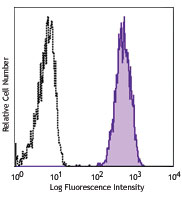
Compare Data Across All Formats
This data display is provided for general comparisons between formats.
Your actual data may vary due to variations in samples, target cells, instruments and their settings, staining conditions, and other factors.
If you need assistance with selecting the best format contact our expert technical support team.
-
Purified anti-human erbB3/HER-3
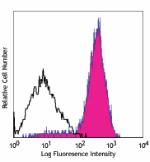
Human breast cancer cell line MCF-7 stained with purified 1B... 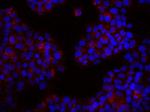
BT474 breast cancer cells were stained with anti-HER3 (clone... -
Biotin anti-human erbB3/HER-3
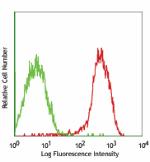
Human breast cancer cell line, MCF-7, stained with biotinyla... -
PE anti-human erbB3/HER-3
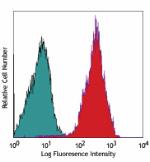
Human breast cancer cell line MCF-7 stained with 1B4C3 PE -
APC anti-human erbB3/HER-3
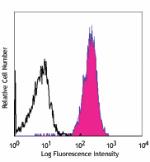
Human breast cancer cell line MCF-7 stained with 1B4C3 APC -
PE/Cyanine7 anti-human erbB3/HER-3
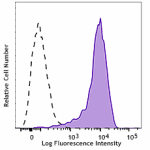
Human breast cancer cell line MCF-7 stained with erbB3/Her-3... -
TotalSeq™-A1469 anti-human erbB3/HER-3
-
TotalSeq™-C1469 anti-human erbB3/HER-3
-
TotalSeq™-B1469 anti-human erbB3/HER-3










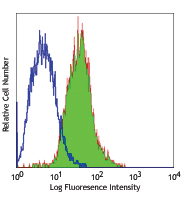
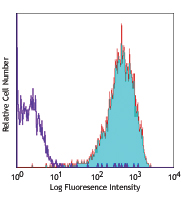



Follow Us